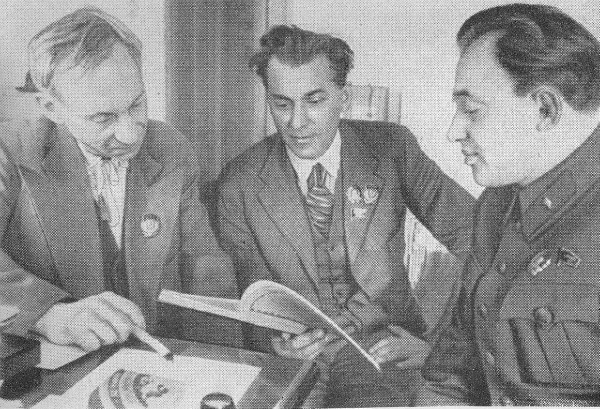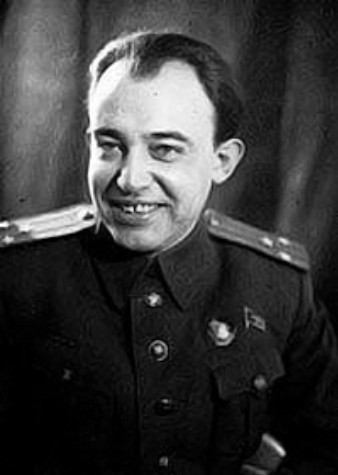Korniichuk, Oleksander
Korniichuk, Oleksander [Корнійчук, Олександер; Kornijčuk], b 25 May 1905 in Khrystynivka, Kyiv gubernia, d 14 May 1972 in Kyiv. Dramatist and prominent Soviet Ukrainian political figure. He worked as a scenarist at the Kyiv Artsitic Film Studio (1929–31), Kharkiv Artistic Film Studio (1931–2), and the Odesa Artistic Film Studio (1932–4). In 1934 he became a member of the executive of the newly created Writers' Union of Ukraine (WU). A protégé of Joseph Stalin, he was promoted to numerous positions: deputy to the Supreme Soviet of the Union of Soviet Socialist Republics (from 1937) and the Supreme Soviet of the Ukrainian SSR (from 1938); head of the WU (1938–41, 1946–53); full member of the Academy of Sciences of the Ukrainian SSR (from 1939) and USSR Academy of Sciences (from 1943); USSR deputy people's commissar of foreign affairs (1943); Ukrainian SSR people's commissar of foreign affairs (1944); president of the Supreme Soviet of the Ukrainian SSR (1947–55, 1959–72); member of the Central Committe of the Communist Party of Ukraine (from 1949) and the Central Committee of the Communist Party of the Soviet Union (from 1952); member of the World Peace Council bureau (from 1950) and presidium (from 1959); and first deputy chairman of the Council of Ministers of the Ukrainian SSR and member of the Central Committee of the CPU Presidium (1953–4). After Stalin's death he supported de-Stalinization and the cultural thaw.
Korniichuk's first plays, Na hrani (On the Edge, 1928), Kam'ianyi ostriv (The Stone Island, 1929), and Shturma (The Storm, 1930), attracted little attention. He garnered fame with his play about the Civil War, Zahybel’ eskadry (The Destruction of the Squadron, 1933), which was staged throughout the USSR. His subsequent plays were formulaic and written in the style of socialist realism in conformity with the Party's political imperatives and propagandistic needs: Pravda (Truth, 1937), in which Korniichuk was one of the first to write about the Russian people's ‘fraternal assistance’ to Ukraine; V stepakh Ukraïny (On the Steppes of Ukraine, 1941); the anti-American Misiia mistera Perkinsa v kraïnu bil’shovykiv (The Mission of Mr Perkins in the Land of the Bolsheviks, 1944); Pryïzdit’ u Dzvinkove (Come to Dzvinkove, 1947); Makar Dibrova (1948); Kalynovyi hai (The Viburnum Grove, 1950); Kryla (Wings, 1954); Pam'iat’ sertsia (Memory of the Heart, 1969); and others. His only epic historical drama, Bohdan Khmel’nyts’kyi (1939), is an apologia for the ‘unification’ of Ukraine and Russia; it served as the basis for a feature film (1939) and for Kostiantyn Dankevych's opera of the same name (1951). The popularity of Korniichuk's plays was heightened by their seemingly pointed criticisms of the flaws in the Soviet system (particularly in Kryla); these criticisms, however, never exceeded the bounds set by the Party censors.
Korniichuk's plays have been staged many times, have been published in many editions (the fullest being in five volumes in 1985–7), and have been the subject of a large body of Soviet literary commentary.
BIBLIOGRAPHY
Kobylets’kyi, Iu. Dramaturh i chas: Tvorchist’ Oleksandra Korniichuka (Kyiv 1965)
———. Kryla Krecheta (Kyiv 1975)
Vakulenko, D. Oleksandr Korniichuk: Narys zhyttia i tvorchosti (Kyiv 1980)
Ivan Koshelivets
[This article originally appeared in the Encyclopedia of Ukraine, vol. 2 (1988).]
.jpg)

